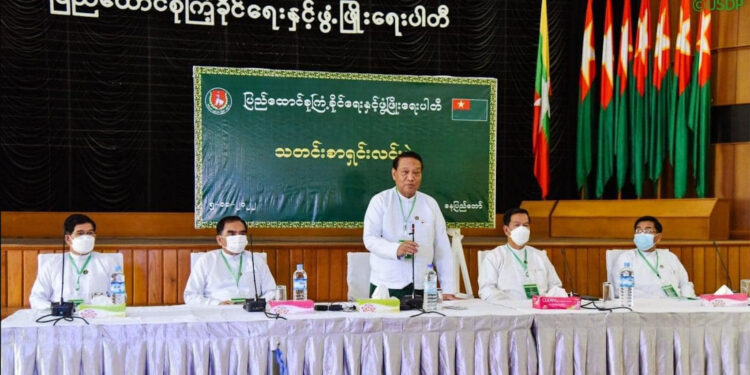Members of the military-backed Union Solidarity and Development Party (USDP), from the rank-and-file to the leadership, have been living in fear since the 2021 coup, according to party spokesman Hla Thein.
USDP leaders have to travel discreetly due to security risks, said Hla Thein, in a video discussing the junta’s planned December election posted on the party’s Facebook page.
He complained that party members and supporters have been targeted since the 2021 coup.
“More than 3,000 have been killed,” he said.
USDP members and supporters have been targeted for assassination by anti-regime guerillas, following the party’s support for a junta that launched a deadly crackdown on anti-coup protests, triggering a nationwide uprising.
Khin Yi, then party vice chairman and now its chief, orchestrated a series of pro-military rallies to pave the way for the February 2021 coup, following the military’s unsubstantiated claims of fraud in the 2020 election, which the ruling National League for Democracy (NLD) won by a landslide. Local and international observers deemed the vote free and fair.
USDP members have since replaced many local administrators and joined junta-affiliated militias like the Pyu Saw Htee – further evidence of the party’s close relationship with the military regime, observers say.
The spokesman revealed that a senior party leader had recently paid a secret visit to Karen and Mon states.
“I am only telling this because he has arrived back [in Yangon]. We are just a political party. We are not an armed organization and [the regime] has not given us any weapons. Our safety is our own responsibility.”
The Irrawaddy could not reach Hla Thein to ask about security risks facing USDP members.
Hla Thein also said that hundreds of members and their families were under the care of USDP headquarters in Naypyitaw after fleeing conflict zones since the coup.
Political analyst U Than Soe Naing said: “As the military continues to oppress the people, people are also targeting the military and its supporters. In this situation, it’s not just uniformed personnel who are at risk but also civilians who align with the military – such as administrators, ten-household chiefs, and individuals involved in military activities. So, the USDP, the military’s party, is facing security concerns.”
The USDP is the successor to the Union Solidarity and Development Association, established by top generals of Than Shwe’s regime in 1993.
Formed ostensibly as a social organization, the USDA acted as the regime’s civilian arm, its policies mirroring those of the junta. Dressed in the party’s civilian uniform of white shirt and green longyi, members of the organization promoted the regime’s image in the eyes of the public.
During the 1990s, civil servants – mainly military personnel and teachers – and students were coerced into joining the USDA as part of the previous regime’s effort to forge a civilian political leadership.
The association was transformed into a political party ahead of the 2010 general elections – the first in 20 years. The party duly won a vote condemned as rigged by international observers, forming a quasi-civilian government that ruled from 2011 to 2016.
The USDP’s leadership, comprised of former military officers, is now gearing up to contest the junta’s election in December. Meanwhile, the regime has imprisoned NLD leaders, including Daw Aung San Suu Kyi, and disbanded the party it ousted along with around 40 other political outfits.

















